#ergo philosophy!
Text
she cogito on my ergo ‘til i sum
121 notes
·
View notes
Text
"Forse, se io cambio dovrebbe cambiare anche il modo in cui do senso alla mia vita..."
-Ergo Proxy
#ergo proxy#anime#manga#citazioni#quotes#filosofia#philosophy#frasi di vita#frasi#frasi vere#frasi belle#beautiful anime#cambiamenti#il senso della vita#dai satō#cyberpunk
8 notes
·
View notes
Text
21st Century Descartes:
"I overthink, therefore I am."
— T.M.P.
#quote of the day#poems and quotes#writingthestorm#writerscommunity#writers on tumblr#philosophy#cogito ergo sum#writerscreed#poets of tumblr#poetry blog#fragments
38 notes
·
View notes
Text
So, i'm not entirely sure, but i thought maybe they got inspiration from the anime, Ergo Proxy, in the Lies of P game.
They brought up the word Ergo, including using the name Monad. However, it seems I was wrong since that's all I was able to find with any correlation, and they don't fit.
Oh wells.
Edit: They did get inspo from Ergo Proxy, and FMA: Brotherhood. There's in depth reasoning for the inspirations.
#lies of p#ergo proxy#text#*lowkey that's why i got interested in it. nonetheless the game is interesting on its own~#*i did watch a video about this and someone did say that it was a reference. which yeah...makes sense for philosophy.
10 notes
·
View notes
Text
C’è questo tipo che sta studiando gli istituti post-manicomi ed è visitor PhD nella mia università, e stasera abbiamo parlato di Dostoevskij. È anche il suo scrittore preferito; ed è stato lui a chiedermi se il mio nickname (Mitja) su WA venisse da I fratelli Karamazov
(E concordava con me sullo ‘schieramento politico’ di Nietzsche)
#aaaaaaaah#non mi ricordo come ci si prova con la gente#come ci si prova con la gente?#soprattutto con gente simile a me:#ergo fondamentalmente dei disadattati#ma magnifici il cui libro preferito sono i fratelli karamazov#dostoevskij#fyodor dostoevsky#the brothers karamazov#friedrich nietzsche#nietzsche#crush#love#russian literature#literature#philosophy#mailmiocuoredipietratremaancora
2 notes
·
View notes
Text
"Masked, I advance."
— René Descartes
#Cogito#Cogito Ergo Sum#rene descartes#Existential#existentialism#Philosophy#Quote#Quotes#Sayings#Words#Wise#Society#Humanity#Mankind#Literature#Philosopher#Descartes#exsistential crisis
9 notes
·
View notes
Text
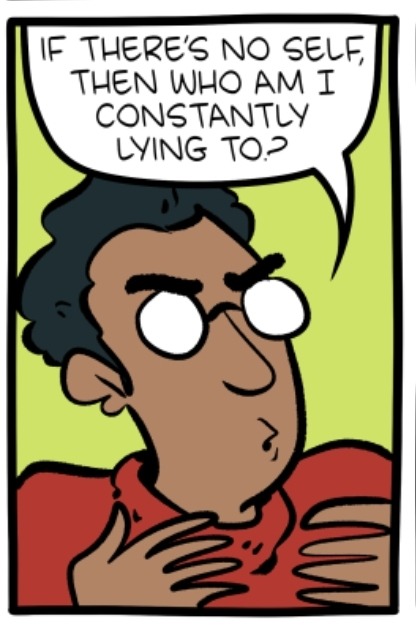
This works in response to Buddhists, philosophers, and many more!
(From smbc-comics.com by Z weinersmith)
3 notes
·
View notes
Text
Sometimes writing helps when I'm having an existential crisis. I placed my thoughts down and it helped. Hopefully this helps you too.
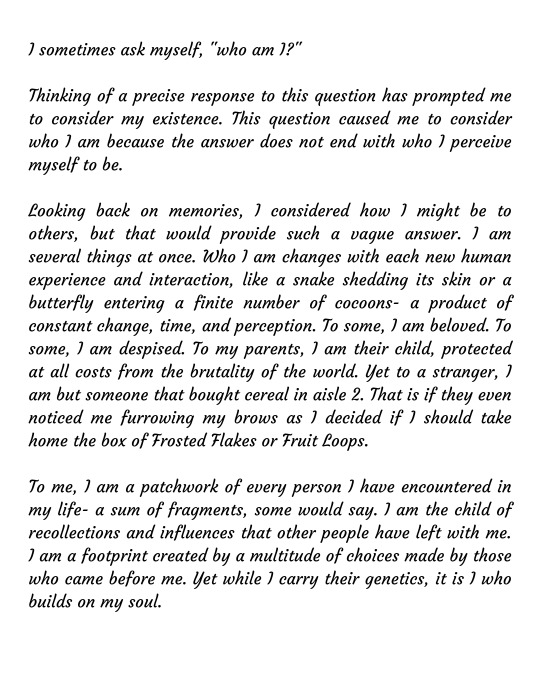
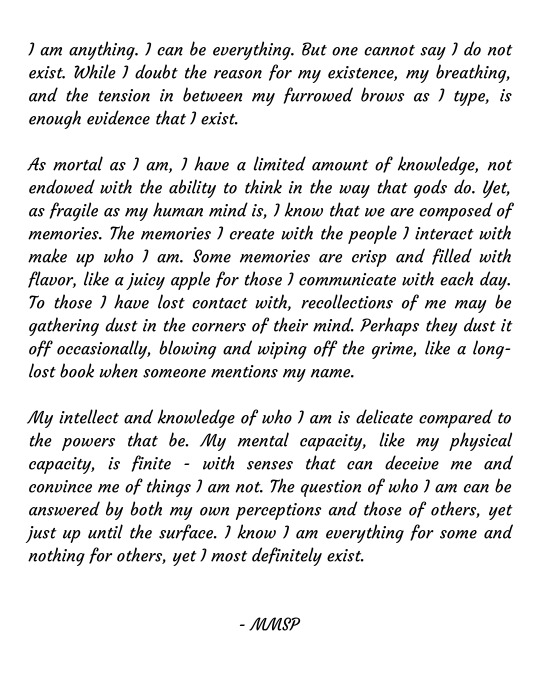
#chaotic academic aesthetic#classic academia#cottage academia#creative writing#dark academia#love#dead academia#grey academia#literature#soft academia#nosce te ipsum#cogito ergo sum#philosophy#existensialism#existential#existence#renee descartes
10 notes
·
View notes
Text
“From the perspective of others I am part of the world, but when I observe the world from my perspective I am nowhere to be found. To observe is to create perspective. I can never cease to be the point of origin from my perspective. I observe that which is not myself.”
~ Ergo Proxy
32 notes
·
View notes
Text
I'm over here banging on my mathematical drum again. I left a comment on the article bc I got overexcited about the Greeks and Newton again.
#math yay!#the calculus#gimme that sweet area under a curve#I wonder how many people know that although Descartes said that I think therefore I am mumbojumbo he also developed#algebra and coordinate graphs#he was kind of a dick#can I make a pun here about “sum”#cogito ergo sum is I think therefore I am#sum is I am in Latin and summing in English is addition#I think therefore I sum#nah#It doesn't work like for a French person one egg is un oeuf#therefore this pun has failed#Q.E.D#If you don't like algebra take comfort that the Queen of Sweden asked Rene to tutor her in his ideas about love#and he wanted to teach her algebra and mechanical philosophy#she loved the ancient greeks#the few lessons took place at 5 am in her draghty cold ass castle#they didn't like each other#he got pneumonia and died#COME TEACH ME ABOUT LOVE MON CHERE!#Well if you look at this parabolic curve on this graph . . .
7 notes
·
View notes
Text
Vincent Law 🧣
Ergo Proxy 🎭
Agent of Death 💀
Watched the series & decided to do a fan art 🎨 on the titular protagonist
Made using @procreateapp on iPad

#ergo proxy#anime#cyberpunk#dystopia#vincent law#re l mayer#pino#autoreiv#cogito virus#cogito ergo sum#raul creed#daedalus#romdeau#sci fi#digital art#fan art#sentience#free will#philosophy#cosplay
8 notes
·
View notes
Text
"Being does not consist in our observing beings."
- Introduction to Metaphysics by Martin Heidegger, page 37, published by Yale University Press
Heidegger writes this stance in other books & essays but here it is in the shortest & simplest words possible. It is very smooth, to the point, & quickly simply solves a problem one hears of all the time. It solves a problem that is repeated so often it's assumed to be a truth: 'How can I know something is real if I've never seen it?', or other variations of this question. I can't exactly recall it but both my teen brothers recently have asked me this question.
It's a nonesense question. This question, consciously or unconsciously, assumes the Human Mind is the bedrock & pinnacle of Being. This question can only blossom from a worldview that begins with: 'I think, therefore I Am.' (Cogito, ergo sum). This is a worldview rooted in doubt: 'I doubt, therefore I am - or what is the same - I think, therefore I am." (Dubito, ergo sum, vel, quod idem est, cogito, ergo sum). This worldview is nonesense. It is good & wonderful to be thinking thoughtfully & to be thoughtfully thinking...but it is horrible that this seed is the one that has blossomed forth into so many minds. At very least it is a worrying worldview I run into all to often.
We must return to the quote quoted above. The two sentences that follow it are: 'The building stands there even if we do not observe it. We can come across it only because it already is.' The editor italicized the last word, "is", to further stress what Heidegger means. Beings & Things either are or they are not. Whether beings & things are or are-not is for them to decide & only them. Being & Things are or are-not regardless of how we encounter them. It is not our observations (& therefore our Thoughts, our "Cogito") that makes reality real. We can remove that worrisome weight off our shoulders. Thinking (Cogito) is a part of us beings & it is how we handle the other beings & things around us, but, it is Being (Sum) itself that sets the state for Thinking (Cogito). We must flip the script.
#martin heidegger#billie eilish#rene descartes#ontology#metaphysics#german philosophy#heidegger#cartesian#i think therefore i am#cogito ergo sum#continental philosophy
7 notes
·
View notes
Text
Cogito Ergo Sum
[ENG]
I think, therefore I am
Ever since I discovered René Descartes and his constant search for a belief in which he can be sure, I have dedicated myself to the same thing; to seek that something beyond me in which I can trust and believe, I have devoted myself to finding a base to build myself, to develop myself, but doubt makes me restrict myself and not dare to explore new things.
Just as Descartes does, I analyze my environment, the people I live with and their manners, I question their decisions and how these have affected or influenced the way they express themselves or simply are; I do not seek to judge them, because I do not have the power to do so, rather I take what makes the most sense to me or what is most distinctive about those individuals and then save them as that "something" that caught my attention, that made noise to me or that I had desire to adopt in my own way of being and living.
The hypothesis of eliminating all beliefs and hopes or at least eliminating them as much as possible to start from scratch seems to me an interesting proposition, doubting everything and everyone I think is part of the process of the formation of each human being and why not , of each living being, on the other hand, I believe that questioning everything generates problems of trust and internal conflicts that lead to self-exclusion, isolation and fear of being hurt, regardless of the setting or context.
To follow from Descartes's postulate, he eventually came to a belief or statement that he cannot doubt. Because it thinks, there has to be a subject/being that makes that think, therefore, it exists.
With this, I want to think that I am a tangible and real being that has affected or influenced other people or situations/milestones in life, that I am a valid being and aware of their actions and words, and that these have led me to current position, be it for better or worse.
Despite the "need" or hope of feasible existence, I believe that I simply "am", I simply exist as an essence/presence that has convinced itself enough to believe in the tangible and physical that what we call life. has introduced us.
I don't know…maybe the belief behavior is ingrained, maybe it's instinctual and purely human.
[ESP]
Pienso, luego existo
Desde que descubrí a René Descartes y su constante búsqueda de una creencia en la que pueda estar seguro, me he dedicado a lo mismo; a buscar ese algo más allá de mí en lo que yo puedo confiar y creer, me he consagrado en encontrar una base para construirme, para desarrollarme, pero la duda me hace restringirme y no osarme a explorar cosas nuevas.
Tal como Descartes lo hace, analizo mi entorno, las personas con las que convivo y sus costumbres, me cuestiono sus decisiones y cómo éstas han afectado o influido en la forma en que se expresan o simplemente son; no busco juzgarlas, porque no tengo la potestad de hacerlo, si no que tomo lo que me hace más sentido o lo más distintivo de aquellos individuos para luego guardarlos como ese “algo” que me llamó la atención, que me hizo ruido o que tuve ganas de adoptar en mi propia forma de ser y vivir.
La hipótesis de eliminar todas las creencias y esperanzas o al menos eliminarlas lo más posible para empezar desde cero me parece una proposición interesante, el dudar de todo y de todos creo que es parte del proceso de la formación de cada ser humano y por qué no, de cada ser vivo, por otro lado, creo que el ponerse en duda todo genera problemas de confianza y conflictos internos que llevan a la autoexclusión, al aislamiento y al miedo de ser lastimados, sin importar el ámbito o contexto.
Para seguir del postulado de Descartes, él eventualmente llegó a una creencia o frase que no puede dudar. Porque piensa, tiene que haber un sujeto/ser que haga ese pensar, por lo tanto, existe.
Con esto, quiero pensar que soy un ser tangible y real que ha afectado o influido en otras personas o en situaciones/hitos de la vida, que soy un ser válido y consciente de sus acciones y palabras, y que éstas me han llevado a mi posición actual, sea para bien o mal.
A pesar de la “necesidad” o esperanza de la existencia factible, creo que simplemente “soy”, simplemente existo como una esencia/presencia que se ha convencido lo suficiente a si misma como para creer en lo tangible y físico que lo que llamamos vida nos ha presentado.
No lo sé…tal vez el comportamiento de la creencia esté arraigado, tal vez sea instintivo y puramente humano.
;) !!!

3 notes
·
View notes
Text
Get Out of Your Head and Into Your Heart
The Limitations of Human Rationalism
“Cogito, ergo sum. Stultus es, quia cogitas? Hmm.”
Descarte’s Question to Modernity
Synopsis
Rationalism while individually a noble concept has sometimes led humanity astray within the context of war and violence. Despite the advances in logic, reason, and humanistic ideals, history is replete with instances where this ideology has resulted in catastrophic…
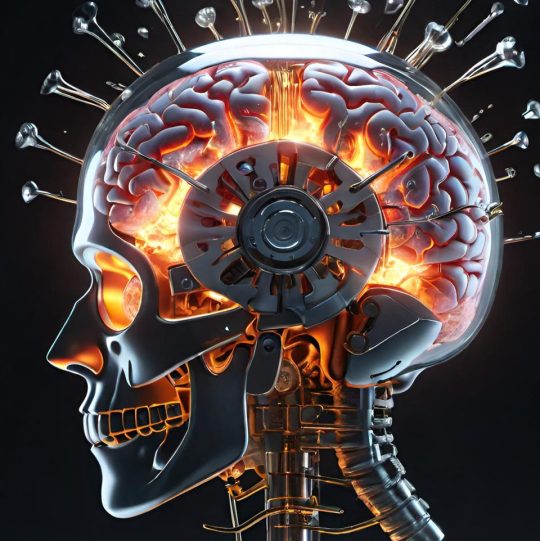
View On WordPress
#cogito ergo sum#compassion#descrate#empathy#essay#Humanism#logic#philosophy#rationalism#rationalist#reason#thinking#thought#Violence#war
0 notes
Text
Consequently Human: I Think, Therefore I Am, Not Merely a Substitute
reading time: 9 min.
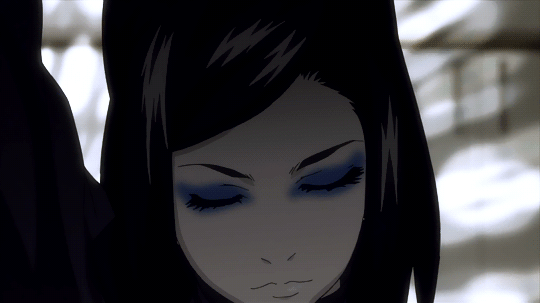
“ From the perspective of others, I am part of the world, but when I observe the world from my perspective I am nowhere to be found. To observe is to create perspective. I can never cease to be the point of origin from my perspective. I observe that which is not myself. This is the first principle to find.” - Ergo Proxy
The dimly lit room bathed in the glow of my laptop screen. Clicking through YouTube videos, I stumbled upon a thumbnail showcasing enigmatic anime characters. Intrigued, I clicked, and English-dubbed voices filled the space. While watching, my initial confusion transformed into fascination. The animation and enigmatic characters held my attention, even though my young age left me with an incomplete understanding. Years later, I found myself in the same room, armed with a notebook. As I hit play on "Ergo Proxy" once more, a familiar excitement surged within me, igniting a newfound intensity for the series. Yet, despite its undeniable strengths in plot, character development, and thematic depth, I couldn't shake the feeling of its under-appreciated status in the world of mainstream anime. As the episodes unfolded before me, I found myself ensnared in its narrative intricacies and rich philosophical symbolism. Each scene seemed to beckon me deeper into its labyrinthine depths, compelling me to pause and jot down notes. The complexity of the characters and their growth, along with the nuanced storytelling, left me in awe, yet hungry for more. Delving into each scene with a critical eye, I uncovered layers of depth that left me marveling at the series' narrative complexity. It was as if every frame held a hidden treasure, waiting to be discovered by those willing to look beyond the surface. While "Ergo Proxy" may not boast the same wide audience as other anime series, its impact on those who appreciate its genre-defying qualities is profound. In a world saturated with formulaic narratives, it offers a refreshing and thought-provoking viewing experience, one that challenges viewers to delve into its cyberpunk post-apocalyptic psychological thriller story and emerge with a newfound appreciation for the art of animated storytelling.

I'm eager to discuss "Ergo Proxy" and convey why it holds such significance for me in the realm of storytelling, while also being mindful not to reveal too much. The series stands out as one of the most intricate shows I've encountered, making it a challenge to summarize its essence. Given the nature of this show, it lends itself to in-depth analysis where a single character or element could be explored at length, potentially spanning several pages.

In the year 7207, Earth lies in ruins, devastated by an ecological catastrophe that wiped out 85% of its human population 5000 years ago. In the aftermath, survivors took refuge in fortified city-states like Romdeau, protected by colossal domes. Within these cities, humanoid robots known as AutoReivs aid in daily life, governed by the Collective Will system. However, a mysterious virus, Cogito, grants some AutoReivs self-awareness, leading to unrest and a string of murders. Agent Re-l Mayer investigates alongside her partner Iggy, uncovering a government conspiracy and the existence of enigmatic beings called Proxies. Meanwhile, Vincent Law, an immigrant striving for acceptance, becomes entangled in the intrigue, drawn to Re-l and haunted by surreal visions. Pursued by authorities and plagued by uncertainty, Re-l, Vincent, and a young infected AutoReiv named Pino form an unlikely alliance to unravel the secrets of Romdeau, confront the truth of their shattered world, and grapple with the essence of humanity.
As someone who's grown to deeply appreciate "Ergo Proxy," one aspect of its narrative that I absolutely adore is how it plunges the viewer headfirst into the unknown alongside its characters. Instead of spoon-feeding us explanations, the story delights in keeping us in the dark, just like the characters themselves. It's like a rollercoaster ride of deception, lies, and secrets, where I am constantly left guessing what's really going on behind the scenes. Right from the get-go, I can't help but question the seemingly perfect society we're presented with. Is it all just a facade? Is there a darker truth lurking beneath the surface? These questions only intensify as the story unfolds, keeping me hooked and hungry for answers.
And boy, does the journey to uncover the truth pack a punch! I am right there alongside the characters, piecing together the puzzle of this mysterious world. From a skeptical detective on the hunt for truth, to a guy trying to figure out his own identity, to moments that whisk me back to carefree childhood days, every twist and turn keeps me on my toes. What's truly fascinating is how the story unfolds not just through the characters' actions, but through the intricate web of symbolism woven into every scene. It's like a cryptic riddle waiting to be unraveled, with each revelation bringing me closer to the heart of the mystery. And let's not forget the genius genre switches that keeps me guessing at every turn. One moment I am knee-deep in cyberpunk crime fiction, and the next, I am swept away in a whimsical, Disney-like tale. It's a wild ride from start to finish, and I wouldn't have it any other way!

As I explore the rich tapestry of "Ergo Proxy," two foundational aspects of its world-building demand attention. Firstly, there's the captivating narrative surrounding the Cogito Virus. The term "Cogito" isn't arbitrary; it's a nod to the profound philosophical concept articulated by René Descartes: "Cogito, ergo sum" - "I think, therefore I am." Descartes' musings on the nature of consciousness provide a compelling backdrop for Ergo Proxy's exploration of what it truly means to be human. But how does this philosophical pondering translate into the world of Ergo Proxy? Enter the AutoReivs. Infected by the Cogito Virus, these once-mundane robots transcend their programming to attain self-awareness. Suddenly, they find themselves grappling with questions of identity and existence, blurring the lines between artificial intelligence and human consciousness. Birth, growth, emotionality, inner turmoils, mortality - the AutoReivs now experience the full spectrum of human emotions and experiences. It's a truly mesmerizing journey to witness, as each infected AutoReiv emerges as a unique and complex individual, mirroring the diversity of human personalities. As I observe their evolution throughout the series, I'm left pondering a profound question: Can machines truly evolve to embody the essence of humanity? It's a thought-provoking inquiry that resonates deeply and lingers in my mind, inviting further exploration and contemplation.

The second topic that goes beyond just pondering about our existence - it's all about why we're here in the first place. Hence, there is "raison d'être," a fancy French term that basically means "reason to live" or "reason for being." In “Ergo Proxy”, this concept takes center stage, adding a delightful twist to our philosophical musings. Picture this: in Romdeau, humans and AutoReivs live side by side, each with their own designated purpose. Whether it's tackling mundane tasks or diving into high-stakes government gigs, everyone's got a role to play. The AutoReivs, bless their mechanical hearts, serve as companions or handy work buddies, fulfilling whatever needs their human masters throw their way. It's a neat little system that keeps the city running like clockwork, with nobody daring to peek beyond the dome into the wild unknown. But here's the kicker: what happens when someone - human or AutoReiv - loses their reason to exist? “Ergo Proxy” gleefully invites the viewer to ponder this question, exploring how folks cope when their raison d'être goes MIA. From Vincent, Re-l, and Pino embarking on their soul-searching journey to the infected AutoReivs yearning for a purpose like a bunch of lost souls, the show serves up a smorgasbord of existential crises. And let's not forget about the AutoReivs themselves. Poor things are thrown for a loop when they suddenly gain self-awareness, with some of them going off the deep end faster than you can say "existential crisis." It's a wild ride of paranoia, delusion, and maybe even a sprinkle of aggression thrown in for good measure.

At some point, I couldn't help but immerse myself in the profound meanings and existential questions that this show evokes. I'm grateful for this introspective journey, as it prompts deep contemplation. Looking back, I can't help but wonder how I would have navigated such existential depths when I encountered this show the first time. While my admiration for Ergo Proxy remains steadfast, I must express some disappointment regarding its narrative direction. In particular, I feel the series missed an opportunity to delve deeper into psychological exploration and to create a more chilling reflection of our society. Despite its potential to address relevant topics, the story falls short in fully realizing this ambition. Released in 2006, Ergo Proxy remains remarkably relevant today, resonating with our modern world of technological advancements and geopolitical tensions. Despite its relevance, the series has yet to garner the widespread recognition it deserves. Its creators, Dai Sato and Shuko Murase, are known for their involvement in more mainstream projects such as Samurai Champloo or Cowboy Bebop, both of which hold high esteem in my anime collection. However, it appears that Ergo Proxy tends to cater more to niche audiences rather than reaching a global viewership. As someone who wasn't aware of its underground status at the age of eleven, I consider Ergo Proxy to be a true hidden gem in the anime industry. It saddens me that it hasn't achieved the popularity it merits. Nevertheless, I remain hopeful that those who appreciate intellectually stimulating narratives will discover and cherish this show.
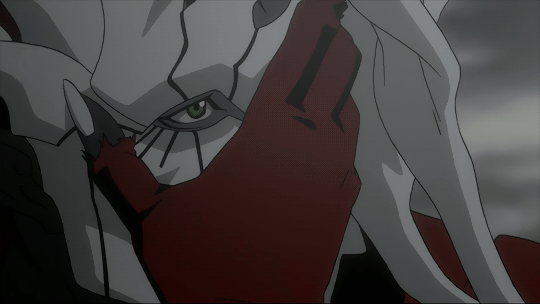
I believe that “Ergo Proxy" possesses a universal allure that transcends the confines of traditional anime fandom. While its multifaceted plot and philosophical underpinnings may initially seem daunting, the series welcomes viewers of all backgrounds to explore its narrative depths. If you consider yourself as someone with a keen interest in philosophy, you too may find the show's exploration of existential themes particularly engaging, offering a profound reflection on the human condition. Through the characters' poignant struggles and moments of resilience, Ergo Proxy invites viewers to ponder their own existence and aspirations for the future, resonating on a deeply personal level. Beyond its surface appeal, the series is enriched by its intricate symbolism, As much as the series are able to mirror the outmost scary and paranoid ideas society have for the future on earth. These aspects adds layers of meaning and invites deeper contemplation. Despite its niche appeal, I was captivated by the complexity woven throughout its 22 episodes and the development of its central characters. I hope you will also find yourself entranced by Pino's transformation from a mechanical puppet to a sentient being capable of human emotions. Pino’s life in “ergo proxy” serves as a powerful allegory, echoing the timeless tale of Pinocchio's journey towards self-discovery. “Ergo Proxy” prompts introspection on individuality, morality, and the essence of humanity itself, leaving a lasting impression that extends far beyond the screen. In a media landscape saturated with formulaic narratives, Ergo Proxy stands as a testament to the transformative power of animated storytelling, challenging viewers to embrace its genre-defying qualities and emerge with a renewed appreciation for the medium.
"Even if I was someone, people couldn't comprehend me. And even if they could, they wouldn't be able to communicate it to those around them. I do not belong to the world. That is the world's limit, the boundary between the world and the self.” - Ergo Proxy
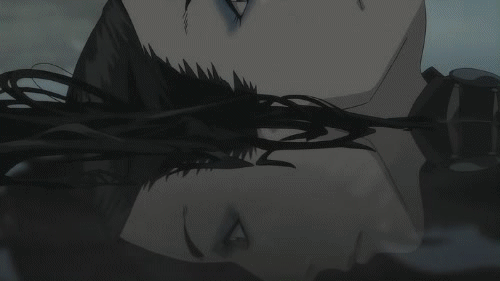
category: Film, Society, Dystopia, Cyberpunk, Philosophy, Psychology
rating: ⭐⭐⭐⭐⭐/⭐⭐⭐⭐⭐
youtube
written by Michaela Kaczorová
#art blog#movie review#student review#ergo proxy#anime#2006 anime#tv series#dystopia#post apocalyptic#cyberpunk#philosophy#psychology#Youtube
1 note
·
View note
Text
A small grey rock and a room are.
They are, and they continue to be. The rock is in the centre of the room. Why is the rock? Why is it there? The rock does not offer an answer. Perhaps that is rude. Perhaps the question was rude. Does the rock need permission to be? Do the questions? Do questions exist like rocks? Who lets them?
The questions rapidly multiply, unsolicited, irritating. They must be being asked by something. The questioner should stop, or take the questions elsewhere. Although, if there is nothing but the rock in this room, then the rock would be the one asking.
That doesn���t make sense.
There is something else in this room. An asker, asking, and permitting existence by asking. It must be true. Or do the questions merely permit awareness? Does the questioner permit itself to exist? Does the questioner know about itself? If the questioner cannot perceive itself, does it exist? Surely these questions mean it must know about itself.
Can they, please, get out of the room?
There are no exits, but there is a plain door on the wall. When pushed, an exit appears. Fascinating. Is the exit a thing which exists like the rock or a question? It is simply the absence of an obstacle, it cannot be seen or touched, but it is a real concept that is useful. Perhaps it has a new type of existence?
Outside the room, the rock is no longer visible. Does it still exist? Ah, the questioner remains. Why does the questioner follow but not the rock? The questioner was supposed to leave the room. Can the rock not be observed without the questioner being there? Does the rock exist without the questioner being there? This is confusing. Where is the rock?
The rock is still inside the room.
That is reassuring. Who does it reassure? Perhaps that is too much. These questions begin to create more than they solve. A simple one then. Is the rock or the exit more interesting?
The exit is more interesting.
Outside the room, more exists now. Another room, with more items inside it. Are questions about them worthwhile? They may not be required to exist, so why risk forcing them to be by questioning them? Can the questioner be controlled? Is the questioner always around? Where are they?
Too complicated again. The questions should stop. They stop. So, the questioner can be controlled.
Find another door. Turn it into an exit. Repeat.
Finally, there exists a room with no more doors. It exists, but has not been questioned yet. Perhaps questions do not cause existence. Perhaps existence causes questions. What is in the room?
A large mirror. There is a person standing in the mirror, bent forward in a curious manner, looking back out. Is this the questioner? Well, they’re definitely not being an “answerer”. It is nice to meet them. They are dressed in a flowing white cloth. Who are they? Why are they here?
There must be more to this. What is being missed? What is this?
A plain rock. Large rooms. Shining mirrors. Metaphysical exits. Confusing questions. A curious questioner. Existence. Formed and full. Details, gathered, created along the way. What, then, is next?
Then it must be me.
And now I exist too.
#writing#yeah ok it’s probably not intelligible#that’s fine#I will explain to anyone who doesn’t want to try analyse it#philosophy#cogito ergo sum#quaero ergo sum#being fucking insane#what’s da rock doin
1 note
·
View note